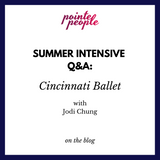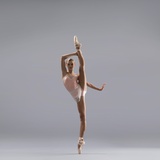When you tendu, what are you thinking of?
Are you thinking of your toes? Brushing the floor with the ball of your foot? Arch lifting? Or are you thinking of what you’re going to do later tonight? How tired you are? Or of rehearsal later tonight? How sore you are after yesterday?
I’ve been there. A dancer’s day can be exhausting, and that is a part of being a dancer. Committing to the same steps every day is an exercise in mastery, moving all of your body, mind, and soul at the same time in the elusive flight of dancing.
That last part, body, soul, and mind is key. Though your teacher may tell you prompts to think about in class, or where to turn your mind, the rest of the time your mind may wander off. But actually, just as important as your feet, your pointed arch, your port de bras, is your dancing strongest ally - your mind.
As Bruce Lee said, “as you think, so you shall become.” So if you’re starting every day thinking how tired you are, how boring class is, how the minutes drag into hours -- well, it’s going to affect your dancing.

The act of mindfulness is a practice for noticing what thoughts drift through your mind to better your overall life. When you practice mindfulness, you notice what thoughts you have when, and start to see patterns. If you’re having thoughts about how tired you are, is that because you did not get enough rest last night or because you’re reaching an Athlete’s power moment to push through for greater strength? When you notice these thoughts, you can check your surroundings and experiences to understand what prompts those thoughts.
For example, if you show up to grande battement every day and think, “Ugh, I HATE grande battements. I’m so bad at them.” Definitely, you might dislike them (for good reason - I had an instructor who would make us do 16 EACH way, twice on each side. Saturdays were dreaded.). And if you show up every time at grande battement time thinking of how bad you are at them, how much you dislike them, how this suuuucksss, then you’re going to stay disliking them and not improve.
In mindfulness, you would notice these thoughts, “Hey, I think about how much I dislike grande battements each time I take class.” Then you could go, “Hey, I do dislike them AND I want to get better. So I am going to approach them each time as a challenge rather than a chore.” Or you can start noticing how your foot brushes on the ground, how your muscles feel warmer after class, thinking of how well you’ve improved compared with last year, thanking yourself for doing yet another battement.
So much of ballet can be what you’re NOT doing -- leg not high enough, not on your leg, not doing the right step -- that noticing what you are doing can encourage you to do even better.
Another step to noticing your mind is using a skill from Dialectical Behavioral Therapy called, “Turning the Mind.” Essentially when you notice yourself having thoughts of being tired, upset, irritated, sore, have something else to turn your mind towards. Instead of thinking you are tired, try thinking how awake you are, how excited you are to approach a new challenge, or even noticing you’re tired and pledging to get more sleep, and thanking yourself for noticing this. You might still be feeling begrudging, and still your new thoughts will allow you to begin change your emotions to something else.
The key with mindfulness is just being aware of thoughts. Judgmental, negative, irritated, envious thoughts (“why did THEY get that role?”) are normal, especially when you’re in close quarters for all hours of the day. Rather than being upset noticing these thoughts or judging yourself for having them, being mindful of them allows you to see when they occur and then decide how you want to refocus your mind.
Mindfulness can often be misconstrued with meditation and the idea you have to sit still. Really, noticing what you’re thinking of any time of the day is mindfulness. Any activity can be mindful, from tying your ribbons, to noticing how your body feels, to checking how you feel in a step. And by noticing your mind (in a nonjudgmental way!) and tracing your thoughts, you can shift your mind to most effectively think your way to better dancing.



